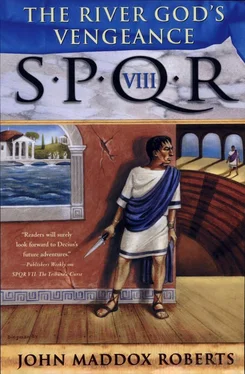John Roberts - The River God
Здесь есть возможность читать онлайн «John Roberts - The River God» весь текст электронной книги совершенно бесплатно (целиком полную версию без сокращений). В некоторых случаях можно слушать аудио, скачать через торрент в формате fb2 и присутствует краткое содержание. Год выпуска: 2004, ISBN: 2004, Издательство: St. Martin, Жанр: Исторический детектив, на английском языке. Описание произведения, (предисловие) а так же отзывы посетителей доступны на портале библиотеки ЛибКат.
- Название:The River God
- Автор:
- Издательство:St. Martin
- Жанр:
- Год:2004
- ISBN:9780312323196
- Рейтинг книги:4 / 5. Голосов: 1
-
Избранное:Добавить в избранное
- Отзывы:
-
Ваша оценка:
- 80
- 1
- 2
- 3
- 4
- 5
The River God: краткое содержание, описание и аннотация
Предлагаем к чтению аннотацию, описание, краткое содержание или предисловие (зависит от того, что написал сам автор книги «The River God»). Если вы не нашли необходимую информацию о книге — напишите в комментариях, мы постараемся отыскать её.
The River God — читать онлайн бесплатно полную книгу (весь текст) целиком
Ниже представлен текст книги, разбитый по страницам. Система сохранения места последней прочитанной страницы, позволяет с удобством читать онлайн бесплатно книгу «The River God», без необходимости каждый раз заново искать на чём Вы остановились. Поставьте закладку, и сможете в любой момент перейти на страницу, на которой закончили чтение.
Интервал:
Закладка:
“Improving your skills as a scribe, Hermes?” I asked.
He refolded his knife, stuck it beneath his tunic belt, and affected not to notice my ominous tone. “This is fresh wood,” he said, tapping the newly carved letters of his name. I had to admit he had carved the letters with some precision. Beads of sap oozed from the incised lines.
“Is that so? I was wondering how a building constructed of new materials could fall, but I was learning that there are many foul little secrets to the builders’ trade.”
“You aren’t supposed to build with wood this fresh,” he went on.
“Really?” In truth, the only experience I had with construction was the army sort: putting up bridges and siege works. For that you used whatever timber was readily available, usually cutting it on the spot.
“It’s supposed to age and dry out. Wood this new will warp and rot quickly, not to mention all that sap will make it burn hot as a potter’s kiln.”
“You don’t say. Someone is going to have all sorts of fun prosecuting these people.” I wasn’t really that dense, just preoccupied. My mind was still reeling from the implications of Metellus Scipio’s daughter marrying Pompey. If there should come a break between Caesar and Pompey, the family could demand that I divorce Julia. What would I do then? I noticed that Hermes had been carving his name all over the timbers heaped on the cart.
“I knew it was a mistake giving you that knife.” It had been a Saturnalia gift a couple of years before, a fine Gallic blade cunningly jointed to fold back into its handle. The blade was no longer than the width of a man’s palm, so I couldn’t be accused of arming a slave. “I suppose it gives you some satisfaction knowing that your name is destined to be immortalized at the bottom of a landfill.”
He smiled. “I have to practice somewhere. You never give me enough time.”
“You’ve never done an honest day’s work in your life, imp.” Hermes was a handsome, strapping young man at this time, in his early twenties, brown and fit from his time campaigning with me in Gaul and exercising in the ludus almost every day in Rome. Always an eager student of arms, this enthusiasm for writing was new. He had a lively, quick intelligence, which nicely complemented his many criminal proclivities. An uncle gave him to me as a present several years previously, when I set up my own household. He was Roman-born, despite his Greek slave-name.
“More bodies here!” shouted the slave.
“They’re getting down to the rich people’s quarters,” Hermes noted.
“Then let’s see who we have.” I walked with him over to the rubble, which was beginning to take on a pitlike appearance as the debris of the roof and upper stories were carried away. The ground fioor had collapsed into the basement. As in most such houses only the ground fioor had water piped in. This had been shut off soon after the building fell, but enough had fiowed in to leave a foot or two in the basement and already bits of rubble could be seen sloshing around in it.
The slaves were handing up bodies to workers above. Most, of course, would be slaves. A rich man’s household would contain far more slaves than family members. The corpses were mostly naked or nearly so, since the disaster had occurred when everyone was asleep. It can be difficult to distinguish between a slave and a poor freeman when both are naked, but there is seldom much problem in telling the servile and the wealthy apart, with or without clothes.
Hermes paused by a row of bodies that had the look of household slaves, lacking both the marks of hard labor and the jewelry of the wealthy.
“Whoever the master was, he wasn’t loved,” Hermes observed.
“I noticed.” Many of the slaves had the collars of runaways riveted around their necks. I paused by a dead girl of no more than sixteen. Covered by plaster dust though she was, it was plain she had been extraordinarily pretty. She wore one of the neck rings. On an impulse, I beckoned to a pair of the public slaves. “Turn this one over.”
The burly men stooped, took her by the shoulders and ankles, and rolled her onto her face. The girl’s back, buttocks, and thighs were crisscrossed with a net of deep, ugly whip marks. This had not been somebody playing games with a ceremonial ?agellum; that stings but doesn’t cut. These were the marks of a bronze-clawed ?agrum , laid on with a will. A hundred lashes from one of those can kill a grown man. Many of the wounds were so fresh that they had bled only hours before, and these were laid atop older, partially healed slashes.
“What could a child like this have done to deserve such punishment?” I mused.
“We haven’t seen the mistress of the household yet,” Hermes said. “If she was some ugly old bag, just being that young and pretty was reason enough.” His face and voice were as impassive as any well-schooled slave’s. We had grown close over the years, but I knew that I would never know what he felt looking upon such a sight.
I had some of the other bodies turned over. Many of them were marked as the girl had been, even some who did not wear runaway collars. One was different. She was a plump, middle-aged woman wearing a few cheap bangles, unmarked by punishment. Her hands had never washed clothes or dishes, and she was well fed.
“This is the one who told on the others,” Hermes said, “the housekeeper.”
“Ah, well, my office doesn’t regulate the happiness of households. It does, however, have supervision over buildings. I want a look at these foundations as soon as the wreckage is cleared away.”
Not long after this, two more bodies were brought up and laid out. “I think we have the master and mistress now,” I noted.
The man was portly, baldheaded, with a fringe of gray above the ears. He wore a citizen’s ring but no other jewelry, no marks of military service either. Even minimal soldiering usually leaves a few scars.
The woman, likewise, had considerable heft. Her hair was hennaed and had once been elaborately dressed. She wore an abundance of rings, bracelets, necklaces, and earrings, which she apparently slept in. Even in death her face, with its piggy eyes and small, downturned mouth, was that of a vile-tempered shrew.
“Look there,” Hermes said, pointing to a smashed chest from which had spilled some white tunics, one of them now fioating in the shallow water. The tunics bore the narrow red stripe of an eques , Rome’s wealthy but not noble class, those who made their fortunes through business rather than land.
“Now we know his rank, anyway,” I said. The bodies were laid out side by side, but their heads were turned away from one another, as if they disliked each other as much in death as in life. The angle was unnatural though.
“Their necks were broken,” I commented. “Must have happened when they fell through into the basement.”
“Most likely,” Hermes said, probably wishing they had died of something more lingering.
“Find me somebody who might be able to confirm the identity of these two,” I told him. “I’m surprised no relatives have come to inquire about them yet. News of this must have been all over Rome before noon.”
A few minutes later, Hermes returned with a shopkeeper in tow. “I couldn’t find any neighbors who knew about them,” he reported, “but this man says he dealt with some of their slaves.”
“Is this possible?” I said. “This is Rome. Everybody knows all their neighbors’ business. Did none of the neighbors know these people?”
“They only moved in less than a month ago, Aedile,” the shopkeeper said. “I don’t think they were from this district, maybe not from Rome at all. Never called on their neighbors that I ever knew about.” He was a stooped little man, smelling pungently of rancid oil. There was no need for me to inquire as to the nature of his business. “Fact is, sir, nobody wanted to have much to do with them.”
Читать дальшеИнтервал:
Закладка:
Похожие книги на «The River God»
Представляем Вашему вниманию похожие книги на «The River God» списком для выбора. Мы отобрали схожую по названию и смыслу литературу в надежде предоставить читателям больше вариантов отыскать новые, интересные, ещё непрочитанные произведения.
Обсуждение, отзывы о книге «The River God» и просто собственные мнения читателей. Оставьте ваши комментарии, напишите, что Вы думаете о произведении, его смысле или главных героях. Укажите что конкретно понравилось, а что нет, и почему Вы так считаете.










